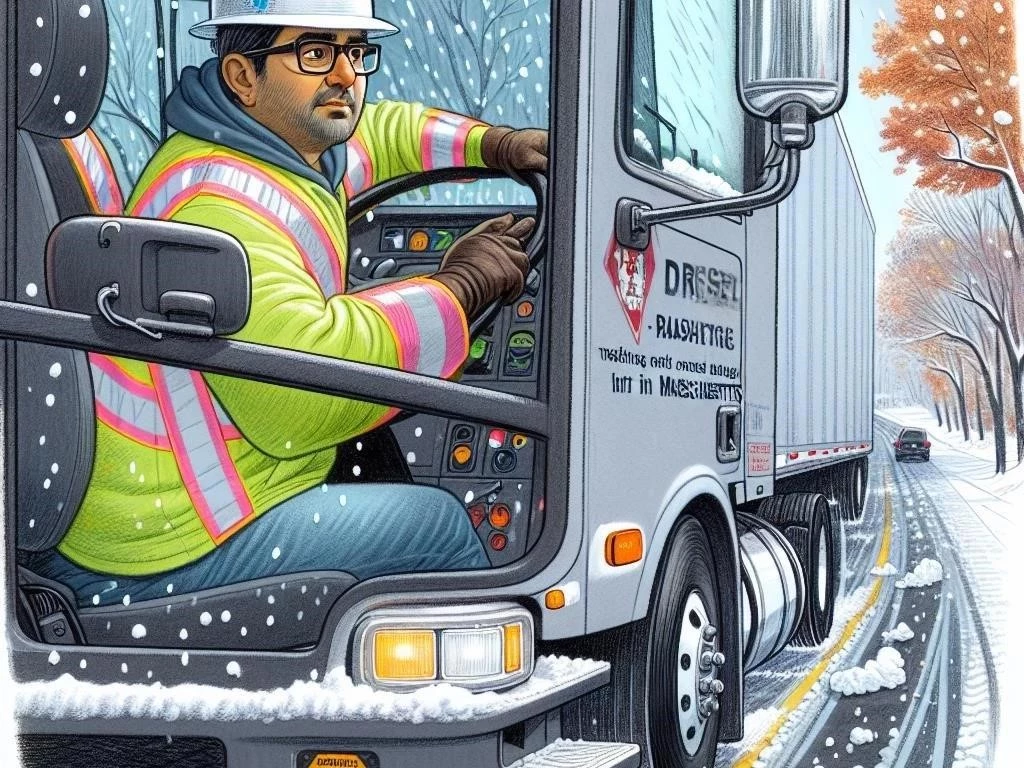a d transport trucking massachusets trucker dangerous

The trucking industry in Massachusetts plays a vital role in transportation, ensuring efficient freight transport while prioritizing safety protocols and adhering to trucking regulations․
Overview of Transportation in Massachusetts
Transportation in Massachusetts encompasses various modes, including public transit, commercial trucking, and freight transport․ The trucking industry is essential for moving goods across the state and beyond․ With numerous trucking companies operating in the region, the logistics management system has grown increasingly complex․ Truck drivers navigate busy highways, balancing efficiency with safety․ However, hazardous driving conditions and the need for vehicle maintenance present challenges․ Effective driver training, adherence to trucking regulations, and robust safety protocols are crucial to minimizing accident risks․ Overall, the state’s transportation network continues to evolve, addressing the demands of modern commerce while ensuring road safety․

Importance of the Trucking Industry
The trucking industry serves as the backbone of Massachusetts’ economy, facilitating the movement of goods and services․ This sector is vital for supporting local businesses and ensuring timely delivery of products․ Trucking companies play a crucial role in logistics management, enabling efficient freight transport across various regions․ Additionally, the industry provides numerous job opportunities, contributing to employment rates․ As commercial vehicles traverse highways, the need for truck driver safety becomes paramount․ Implementing safety protocols and adhering to trucking regulations is essential in reducing accident risks and ensuring road safety for all users of the transportation network in Massachusetts․

Understanding Truck Driver Safety

Truck driver safety is crucial for minimizing accidents, addressing driver fatigue, and ensuring compliance with trucking regulations while navigating hazardous driving conditions and unpredictable highway environments․

Key Factors Affecting Driver Safety

Several key factors significantly influence truck driver safety in Massachusetts․ First, the condition of highway infrastructure plays a critical role, as poorly maintained roads can increase accident risks․ Weather conditions, such as rain or snow, also contribute to hazardous driving situations․ Additionally, driver fatigue remains a major concern, as long hours on the road can impair judgment and reaction times․ Moreover, adherence to load securement practices is essential for preventing cargo movement that could lead to accidents․ Lastly, ongoing driver training and education on safety protocols are vital to ensure that truck drivers remain vigilant and aware of potential dangers while driving․

Statistics on Trucking Accidents in Massachusetts
Trucking accidents in Massachusetts remain a significant concern for road safety․ Recent statistics indicate that commercial vehicles are involved in approximately 10% of all accidents in the state․ Of these incidents, a considerable percentage results in severe injuries or fatalities, highlighting the importance of truck driver safety․ Moreover, the data reveals that driver fatigue and hazardous driving conditions contribute to many of these accidents․ It is essential for trucking companies to implement rigorous safety protocols and training programs to address these issues․ By analyzing accident statistics, stakeholders can develop effective strategies to reduce risks and improve overall safety on Massachusetts roads․
Hazardous Driving Conditions
Hazardous driving conditions significantly impact truck driver safety, with factors such as weather, road quality, and visibility affecting overall performance and increasing accident risks on highways․

Common Causes of Dangerous Driving Conditions

Several common causes lead to dangerous driving conditions for truck drivers in Massachusetts․ Weather-related factors, such as heavy rain, snow, and fog, significantly reduce visibility and traction, increasing accident risks․ Poorly maintained roadways, including potholes and debris, can also pose hazards to commercial vehicles․ Additionally, construction zones often create sudden changes in traffic patterns, further complicating navigation for truck drivers․ Other contributing factors include inadequate signage and poorly lit areas, which can catch drivers off guard․ Addressing these hazards through infrastructure improvements and effective communication is essential for enhancing road safety and minimizing the risks associated with hazardous driving conditions․

Impact of Weather on Trucking Safety

Weather significantly impacts trucking safety in Massachusetts, as adverse conditions can create dangerous driving environments․ Rain, snow, and ice reduce visibility and traction, increasing the likelihood of accidents․ Furthermore, strong winds can affect the stability of large commercial vehicles, making them more susceptible to tipping․ Truck drivers must adjust their driving behavior based on current weather conditions, which may include reducing speed and increasing following distances․ Additionally, severe weather events often lead to hazardous road conditions, such as flooding or snow accumulation, necessitating thorough vehicle maintenance and proper load securement to ensure safety during transportation in unpredictable weather circumstances․

Freight Transport and Commercial Vehicles
Freight transport relies heavily on commercial vehicles, which are essential for delivering goods efficiently․ Understanding their operation and safety is crucial in Massachusetts’ logistics landscape․
Types of Commercial Vehicles in the Industry

The trucking industry in Massachusetts utilizes various types of commercial vehicles, each serving specific purposes in freight transport․ Common vehicle types include tractor-trailers, which are essential for long-haul trucking, allowing for the transportation of large cargo loads across long distances․ Box trucks are often used for local deliveries, providing versatility in urban settings․ Flatbed trucks are employed for hauling oversized or heavy cargo that requires easy loading and unloading․ Additionally, refrigerated trucks are vital for transporting perishable goods, ensuring temperature control․ Understanding these vehicle types is crucial for implementing effective safety protocols and ensuring compliance with trucking regulations․
Challenges in Freight Transport in Massachusetts
Freight transport in Massachusetts faces various challenges that complicate logistics management and impact truck driver safety․ Traffic congestion, particularly in urban areas, creates delays and increases the risk of accidents․ Additionally, the state’s aging infrastructure can lead to hazardous driving conditions, necessitating constant vigilance from truck drivers․ Weather-related issues, such as snow and heavy rain, further exacerbate these challenges, making it difficult to maintain reliable schedules․ Compliance with trucking regulations and addressing driver fatigue also pose significant hurdles․ Finally, securing loads properly is essential for preventing cargo-related accidents, which require ongoing training and adherence to safety protocols across the industry․

Road Safety Regulations and Trucking Laws

Road safety regulations and trucking laws in Massachusetts are designed to enhance safety, protect drivers, and minimize accident risks associated with commercial vehicle operations across the state․
Overview of Trucking Regulations in Massachusetts
Trucking regulations in Massachusetts are established to ensure safety and compliance within the industry․ These regulations encompass various aspects, including vehicle maintenance, driver qualifications, and hours of service․ Truck drivers must adhere to strict guidelines regarding rest periods to combat driver fatigue and maintain alertness․ Additionally, trucking companies are required to implement safety protocols and training programs that align with state and federal laws․ Load securement regulations ensure that cargo is transported safely, reducing accident risks․ Compliance with these regulations is monitored by the Massachusetts Department of Transportation, promoting a safer environment for both truck drivers and other road users․
Key Trucking Laws to Ensure Safety
Several key trucking laws are in place in Massachusetts to enhance safety for truck drivers and all road users․ The hours of service regulations dictate the maximum time truck drivers can operate their vehicles without rest, aiming to prevent driver fatigue․ Additionally, laws regarding vehicle maintenance require regular inspections to ensure that commercial vehicles are roadworthy․ Load securement laws mandate proper techniques for securing cargo, preventing dangerous shifts during transit․ Furthermore, trucking companies must comply with licensing and certification requirements for their drivers․ These laws collectively contribute to reducing accident risks and promoting a safer transportation environment across the state․

Long-Haul Trucking and Associated Risks

Long-haul trucking presents unique challenges and risks, including driver fatigue, extended highway conditions, and the necessity for effective vehicle maintenance to ensure safe transport operations․
Understanding Long-Haul Trucking

Long-haul trucking involves transporting goods over significant distances, often crossing state lines and requiring drivers to spend extended periods on the road․ This type of trucking is crucial for the supply chain, ensuring that products reach their destinations efficiently and on time․ Drivers typically operate large commercial vehicles, which can pose unique challenges, including navigating diverse road conditions and managing fatigue․ Long-haul truckers must adhere to strict regulations governing driving hours and rest periods to maintain safety․ Additionally, proper vehicle maintenance and load securement practices are vital for preventing accidents and ensuring the safe transport of cargo throughout long journeys․

Accident Risks in Long-Haul Trucking
Long-haul trucking presents various accident risks that can jeopardize the safety of drivers and others on the road․ One significant risk is driver fatigue, as long hours behind the wheel can impair judgment and reaction times․ Additionally, challenging highway conditions, including weather changes and road construction, can contribute to accidents․ Poorly maintained vehicles may also increase the likelihood of breakdowns or malfunctions, further elevating accident risks․ Moreover, the potential for cargo shifts or improper load securement can lead to hazardous situations․ Addressing these risks through effective training, adherence to regulations, and regular vehicle inspections is essential for enhancing safety in long-haul trucking․

Vehicle Maintenance and Safety Protocols

Regular vehicle maintenance and strict safety protocols are essential for preventing accidents, ensuring optimal performance, and enhancing overall safety for truck drivers and road users alike․

Importance of Regular Vehicle Maintenance
Regular vehicle maintenance is crucial for ensuring the safety and reliability of commercial trucks operating in Massachusetts․ Routine inspections help identify potential issues before they escalate into significant problems that could lead to accidents․ Key maintenance tasks include checking brakes, tires, lights, and engine performance, all of which are vital for safe operation․ Furthermore, adhering to maintenance schedules not only prolongs vehicle lifespan but also enhances fuel efficiency, reducing operational costs․ Additionally, well-maintained vehicles are less likely to experience breakdowns on the road, thereby minimizing disruptions to logistics management․ Ultimately, prioritizing maintenance is essential for safeguarding drivers and enhancing road safety․

Implementing Safety Protocols in Trucking Companies

Implementing effective safety protocols is essential for trucking companies to minimize risks and enhance overall safety․ Training programs for drivers should cover crucial topics such as accident prevention, load securement, and emergency response strategies․ Regular safety meetings can reinforce the importance of adhering to regulations and best practices․ Additionally, companies should establish clear procedures for reporting hazards and incidents, fostering a culture of safety․ Maintenance schedules must be strictly followed to ensure vehicles remain in optimal condition․ Furthermore, leveraging technology, such as GPS tracking and driver monitoring systems, can help manage driver fatigue and improve compliance with safety regulations in the trucking industry․
Driver Training and Risk Management

Comprehensive driver training and effective risk management strategies are vital for enhancing truck driver safety, reducing accident risks, and ensuring compliance with industry regulations across Massachusetts․
Essential Training for Truck Drivers
Essential training for truck drivers in Massachusetts focuses on developing skills necessary for safe and efficient driving․ This training typically includes instruction on defensive driving techniques, which help drivers anticipate and respond to potential hazards on the road․ Understanding vehicle dynamics and handling different types of commercial vehicles is crucial for safe operation․ Additionally, training programs emphasize the importance of load securement and adherence to trucking regulations․ Drivers are also educated about the impact of fatigue on performance and strategies to combat it․ Regular refresher courses ensure that drivers remain updated on safety protocols and best practices, ultimately reducing accident risks․
Managing Driver Fatigue and Its Risks

Managing driver fatigue is critical for ensuring safety in the trucking industry․ Fatigue significantly impairs a driver’s ability to react quickly, make sound decisions, and maintain focus, increasing accident risks․ Companies can implement strategies to combat fatigue, such as enforcing strict hours of service regulations, ensuring adequate rest periods, and promoting regular breaks during long-haul trips․ Additionally, educating drivers about the signs of fatigue and encouraging open communication about their condition is essential․ Utilizing technology, such as fatigue monitoring systems, can help identify drowsiness․ Prioritizing fatigue management not only enhances road safety but also improves overall driver well-being in Massachusetts․
Load Securement and Its Importance

Proper load securement is essential in the trucking industry, preventing cargo shifts during transport and minimizing accident risks, ensuring safety for drivers and other road users․
Best Practices for Load Securement

Implementing best practices for load securement is vital to prevent cargo-related accidents in the trucking industry․ First, drivers should ensure that loads are evenly distributed across the vehicle to maintain balance․ Utilizing appropriate securing devices, such as straps, chains, and tarps, is essential for holding cargo in place effectively․ Regularly inspecting the load during transit helps identify any shifting issues․ Additionally, drivers should be aware of the specific regulations governing load securement for different types of cargo․ Training programs should emphasize these practices, instilling a culture of safety and accountability among truck drivers, ultimately minimizing the risk of accidents on the road․
Consequences of Improper Load Securement
Improper load securement can lead to severe consequences, significantly increasing accident risks on the road․ When cargo shifts during transit, it can cause drivers to lose control of their vehicles, leading to collisions or rollovers․ Additionally, unsecured loads may fall onto roadways, posing hazards to other motorists and causing multi-vehicle accidents․ Legal repercussions can arise, including fines and penalties for trucking companies that fail to adhere to load securement regulations․ Furthermore, incidents resulting from improper securement can damage goods, leading to financial losses and tarnishing a company’s reputation․ Ensuring proper load securement is crucial for maintaining safety and operational integrity․

Emergency Response in Trucking Accidents
Effective emergency response in trucking accidents is crucial for minimizing injuries, ensuring swift assistance, and maintaining safety protocols while addressing potential hazards on the scene․

Importance of Emergency Response Plans

Emergency response plans are essential for trucking companies to effectively manage accidents and emergencies․ These plans outline specific procedures that drivers and staff must follow, ensuring a swift and organized response to incidents․ By having a clear plan, companies can minimize confusion and enhance coordination among emergency services, reducing the potential for further injuries or damage․ Additionally, training employees on these protocols helps to instill a culture of safety and preparedness․ Regularly reviewing and updating emergency response plans ensures they remain relevant and effective, ultimately contributing to improved safety outcomes for drivers, other road users, and the overall trucking industry in Massachusetts․

Effective Response Strategies for Trucking Companies

Trucking companies must implement effective response strategies to address accidents and emergencies efficiently․ First, training drivers and staff on emergency protocols is vital to ensure everyone understands their roles during a crisis․ Establishing a communication plan that includes notifying emergency services and relevant stakeholders can streamline the response process․ Additionally, maintaining a comprehensive inventory of emergency supplies and equipment, such as first aid kits and flares, is crucial for on-site assistance․ Companies should also conduct regular drills to practice their emergency response plans, allowing for adjustments and improvements․ Ultimately, these strategies enhance safety and preparedness, minimizing the impact of accidents in the trucking industry․
Logistics Management in the Trucking Industry

Effective logistics management is essential in the trucking industry, optimizing routes, enhancing cargo transport efficiency, and ensuring compliance with regulations while prioritizing driver and road safety․
Role of Logistics in Transportation Safety
Logistics plays a critical role in enhancing transportation safety within the trucking industry․ By optimizing routes, logistics management minimizes travel time and reduces exposure to hazardous driving conditions․ Proper planning ensures that trucks are loaded efficiently, maintaining balance and stability, which is crucial for safe transport․ Additionally, logistics systems can facilitate timely vehicle maintenance checks, ensuring that commercial vehicles remain in optimal condition․ Effective communication between dispatchers and drivers allows for real-time updates on road conditions and traffic, enabling proactive decision-making․ Ultimately, prioritizing logistics in transportation safety enhances overall road safety, protecting drivers, cargo, and the public alike․
Strategies for Efficient Cargo Transport

Implementing effective strategies for efficient cargo transport is essential for optimizing operations within the trucking industry․ First, utilizing advanced route optimization software can significantly reduce travel time and fuel consumption, enhancing overall efficiency․ Additionally, adopting just-in-time delivery practices minimizes inventory costs while ensuring timely customer satisfaction․ Regularly training drivers on efficient driving techniques, including fuel-efficient practices, can further contribute to lower operational costs․ Furthermore, investing in technology, such as GPS tracking and telematics, enables real-time monitoring of cargo and vehicle performance․ By fostering collaboration between logistics teams and drivers, companies can streamline processes and improve responsiveness to changing conditions, enhancing overall service delivery․
Improving Safety in the Trucking Industry
Enhancing safety in the trucking industry requires comprehensive training, effective logistics management, and strict adherence to regulations, ultimately protecting drivers, cargo, and other road users․
Future Outlook for Truck Driver Safety in Massachusetts

The future outlook for truck driver safety in Massachusetts appears promising, with ongoing advancements in technology and regulations․ Emerging technologies, such as autonomous vehicles and advanced telematics, are expected to enhance safety by reducing human error․ Additionally, stricter trucking regulations and increased enforcement of safety protocols will likely contribute to lowering accident rates․ Continued emphasis on driver training and education will help prepare drivers for the challenges of the road․ Furthermore, fostering partnerships between trucking companies and safety organizations can promote best practices․ Ultimately, a collective commitment to safety will lead to a safer environment for drivers and all road users․